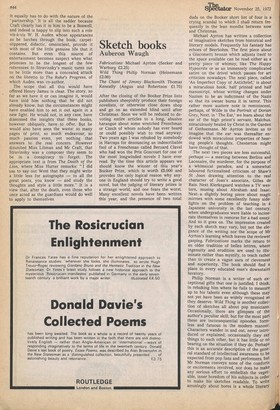Sketch books
Auberon Waugh
Fabrications Michael Ayrton (Seeker and Warburg £2.25) Wild Thing Philip Norman (Heinemann £2.00) The Chant of Jimmy Blacksmith Thomas Keneally (Angus and Robertson £1.75) After the closing of the Booker Prize lists publishers sheepishly produce their foreign novelists, or otherwise close down shop and go on an extended blind until after Christmas. Soon we will be reduced to devoting entire articles to a long, abusive harangue about some wretched Frenchman or Czech of whom nobody has ever heard or could possibly wish to read anyway. Two years ago I was rebuked by somebody in Harraps for denouncing an indescribable fool of a Frenchman called Bernard Clavel who had won the Prix Goncourt for one of the most longwinded novels I have ever read. By the time this article appears we should know the winner of this year's Booker Prize, which is worth £5,000 and provides the only logical reason why anyone in England should try to write a good novel, but the judging of literary prizes is a strange world, and one fears the worst. Many excellent novels have been written this year, and the presence of two total duds on the Booker short list of four is a crying scandal to which I shall return frequently in the lean months between now and Christmas.
Michael Ayrton has written a collection of imaginative sketches from historical and literary models. Frequently his fantasy has echoes of Beerbohm. The first piece about a Giacometti bronze which adjusts itself to the space available can be read either as a pretty piece of whimsy, like The Happy Hypocrite or as an immensely complicated satire on the drivel which passes for art criticism nowadays. The next piece, called An Imperfect Copy of Antichrist,' is about a miraculous book, half printed and half manuscript, whose writing changes under Nazism to be an indictment of the Nazis so that its owner burns it in terror. This rather more austere note is reminiscent, perhaps, of Wilde in the Portrait of Dorian Grey; Next, in 'The Ear,' we learn about the ear of the high priest's servant, Malchus, miraculously healed by Christ in the Garden of Gethsemane. Mr Ayrton invites us to imagine that the ear was thereafter endowed with miraculous properties of hearing people's thoughts. Chesterton might have thought of that.
The next two pieces are less successful, perhaps — a meeting between Berlioz and Lacenaire, the murderer, for the purpose of a whimsical paradox, and a somewhat laboured fictionalised criticism of Shaw's St Joan drawing attention to the real character of Joan's associate, Gilles de Rais. Next Kierkegaard watches a TV western, musing about Abraham and Isaac. Next, a slightly boring piece about magic mirrors with some excellently funny sidelights on the problem of teaching in a Japanese university in the last century, when undergraduates were liable to incinerate themselves in remorse for a bad essay. And so it goes on. The impression created by each sketch may vary, but not the elegance of the writing nor the *scope of Mr Ayrton's learning which leaves the reviewer gasping. Fabrications marks the return to an older tradition of belles lettres, where ingenuity and erudition are used to illuminate rather than mystify, to teach rather than to create a vague aura of cleverness and superiority. The book should find a place in every educated man's downstairs lavatory.
Philip Norman is a writer of such exceptional gifts that one is justified, I think, in rebuking him where he fails to measure up to his talents even although these maY not yet have been as widely recognised as they deserve. Wild Thing is another collec' tion of sketches all about pop musicians. Occasionally, there are glimpses of the author's peculiar skill, but for the most part these are inconsequential episodes. formless and fatuous in the modern manner. Characters wander in and out, never introduced or explained; occasionally they say things to each other, but it has little or no bearing on the situation if they do. Perhaps this is an accurate description of the general standard of intellectual awareness to be expected from pop fans and performers, but Mr Norman conveys none of the comforts or excitements involved, nor does he make any serious effort to embellish the vegetable, inner boredom of his subjects in order to make his sketches readable. To write amusingly about bores is a whole literary technique in itself, as clever Miss Jane Gillespie showed two weeks ago. It is one which Mr Norman apparently scorns. For my own part, I could not make head or tail of his new book and soon grew bored with trying.
Thomas Keneally is also concerned with levels of half-awareness in his study of an Australian aborigine half-caste whose unjust treatment by white farmers drives him to the inarticulate revenge of murdering white women until he is captured and hanged.
I reviewed the book rapturously three months ago when it came out, and awarded it a gold medal, but the review was cut out for reasons of space, so poor Mr Keneally will not even have the comfort of my fool's gold in failing to win the Booker Prize which he so richly deserved.
I hope Mr Norman reads it. He will learn the best way to write about half-wits, or people of limited understanding or whatever is the fashionable expression for this distressing condition. The best way is to observe them and put them in situations where their chief characteristics are made particularly apparent. There is no need for the writer to pretend he is a half-wit himself and slobber across the pages. Mr Norman has talent and intelligence enough for twenty. Mr Keneally demonstrates to perfection the way Mr Norman should have approached the task of writing about pop singers if that is really what Mr Norman wants to do.













































 Previous page
Previous page